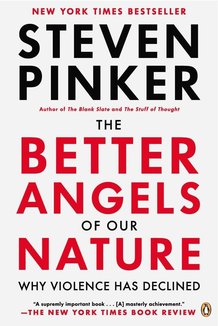Recommended Books

Reasons and Persons
Author:
Derek Parfit
ISBN 13:
978-0198249085
Challenging, with several powerful arguments, some of our deepest beliefs about rationality, morality, and personal identity, Parfit claims that we have a false view about our own nature. It is often rational to act against our own best interests, he argues, and most of us have moral views that are self-defeating. We often act wrongly, although we know there will be no one with serious grounds for complaint, and when we consider future generations it is very hard to avoid conclusions that most of us will find very disturbing.

On Liberty, Utilitarianism and Other Essays (Oxford World's Classics)
Authors:
John Stuart Mill
,
Mark Philp
,
Frederick Rosen
ISBN 13:
978-0199670802
'it is only the cultivation of individuality which produces, or can produce, well developed human beings' Mill's four essays, 'On Liberty', 'Utilitarianism', 'Considerations on Representative Government', and 'The Subjection of Women' examine the most central issues that face liberal democratic regimes - whether in the nineteenth century or the twenty-first. They have formed the basis for many of the political institutions of the West since the late nineteenth century, tackling as they do the appropriate grounds for protecting individual liberty, the basic principles of ethics, the benefits and the costs of representative institutions, and the central importance of gender equality in society. These essays are central to the liberal tradition, but their interpretation and how we should understand their connection with each other are both contentious. In their introduction Mark Philp and Frederick Rosen set the essays in the context of Mill's other works, and argue that his conviction in the importance of the development of human character in its full diversity provides the core to his liberalism and to any defensible account of the value of liberalism to the modern world. ABOUT THE SERIES: For over 100 years Oxford World's Classics has made available the widest range of literature from around the globe. Each affordable volume reflects Oxford's commitment to scholarship, providing the most accurate text plus a wealth of other valuable features, including expert introductions by leading authorities, helpful notes to clarify the text, up-to-date bibliographies for further study, and much more.

The Better Angels of Our Nature: Why Violence Has Declined
Author:
Steven Pinker
ISBN 13:
978-0143122012
“If I could give each of you a graduation present, it would be this—the most inspiring book I've ever read." — Bill Gates A provocative history of violence—from the New York Times bestselling author of The Stuff of Thought , The Blank Slate, and Enlightenment Now . Believe it or not, today we may be living in the most peaceful moment in our species' existence. In his gripping and controversial new work, New York Times bestselling author Steven Pinker shows that despite the ceaseless news about war, crime, and terrorism, violence has actually been in decline over long stretches of history. Exploding myths about humankind's inherent violence and the curse of modernity, this ambitious book continues Pinker's exploration of the essence of human nature, mixing psychology and history to provide a remarkable picture of an increasingly enlightened world.

On What Matters: Volume One (The ^ABerkeley Tanner Lectures)
Author:
Derek Parfit
ISBN 13:
978-0199681037
On What Matters is a major work in moral philosophy. It is the long-awaited follow-up to Derek Parfit's 1984 book Reasons and Persons , one of the landmarks of twentieth-century philosophy. In this first volume Parfit presents a powerful new treatment of reasons and rationality, and a critical examination of three systematic moral theories -- Kant's ethics, contractualism, and consequentialism -- leading to his own ground-breaking synthetic conclusion. Along the way he discusses a wide range of moral issues, such as the significance of consent, treating people as a means rather than an end, and free will and responsibility. On What Matters is already the most-discussed work in moral philosophy: its publication is likely to establish it as a modern classic which everyone working on moral philosophy will have to read, and which many others will turn to for stimulation and illumination.